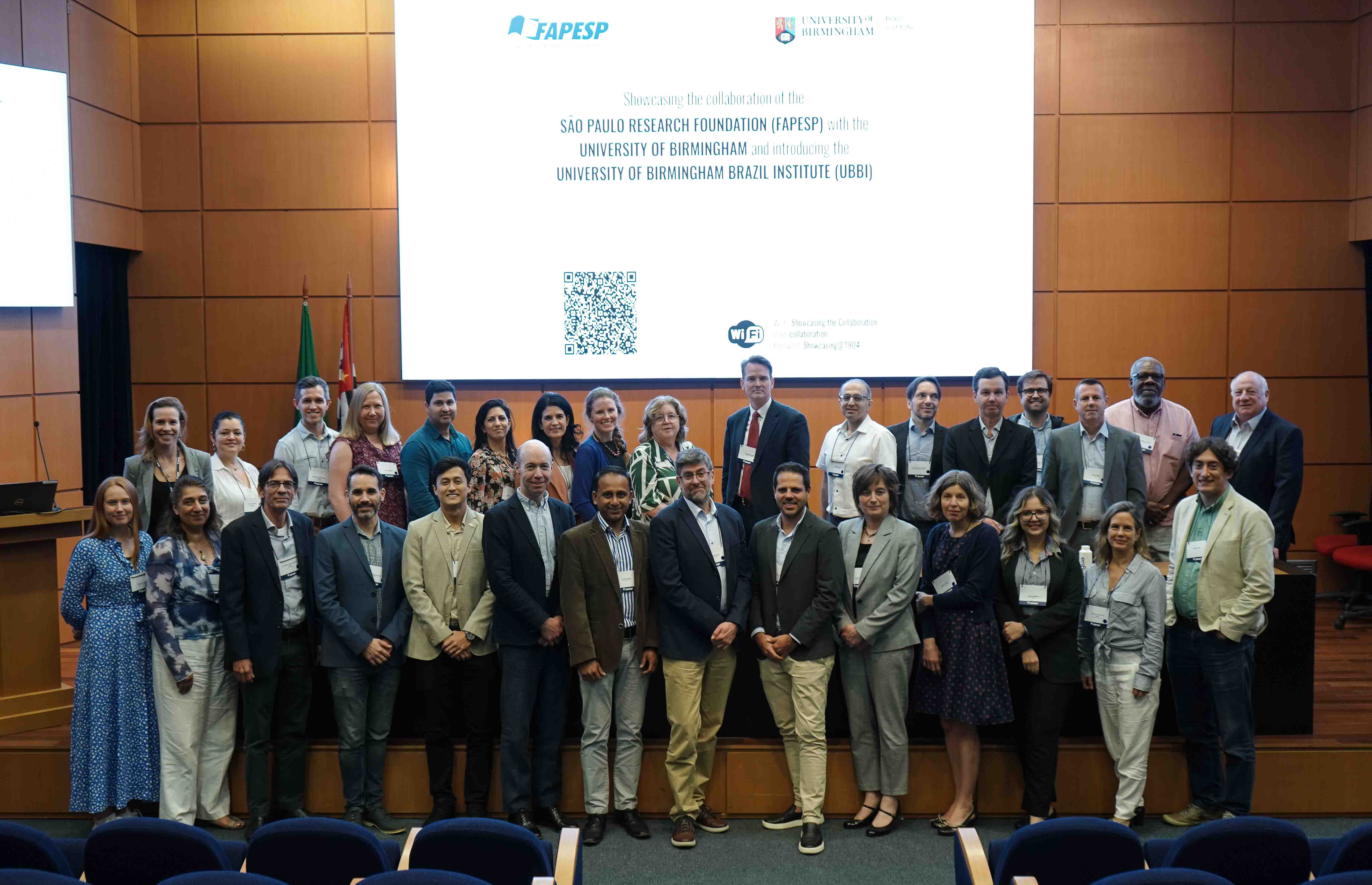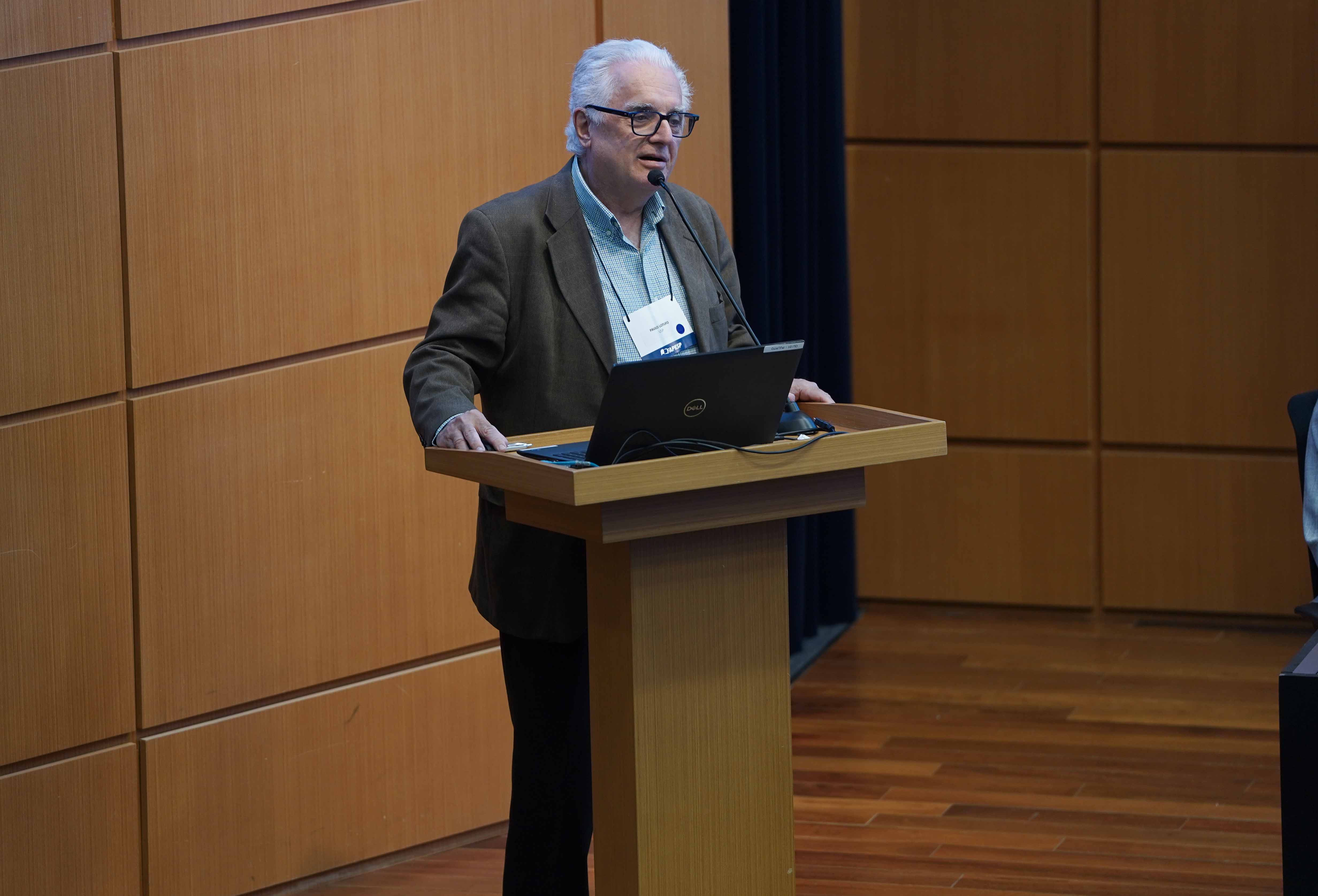

The event “Showcasing the collaboration of FAPESP with the University of Birmingham” took place on April 19, 2024, at FAPESP in São Paulo (photo: Daniel Antônio/Agência FAPESP)
The project, conducted by researchers affiliated with the University of São Paulo in Brazil and the University of Birmingham in the UK, was one of 15 presented at an event held to celebrate the partnership between the British institution and FAPESP. It also marked the launch of the University of Birmingham Brazil Institute, whose mission is to bolster UK-Brazil research collaboration.
The project, conducted by researchers affiliated with the University of São Paulo in Brazil and the University of Birmingham in the UK, was one of 15 presented at an event held to celebrate the partnership between the British institution and FAPESP. It also marked the launch of the University of Birmingham Brazil Institute, whose mission is to bolster UK-Brazil research collaboration.

The event “Showcasing the collaboration of FAPESP with the University of Birmingham” took place on April 19, 2024, at FAPESP in São Paulo (photo: Daniel Antônio/Agência FAPESP)
By Maria Fernanda Ziegler | Agência FAPESP – Scientists affiliated with the Center for Clinical and Epidemiological Research (CPCE) at the University of São Paulo’s teaching hospital (HU-USP) in Brazil are conducting a study to investigate the impact of chronic obstructive pulmonary disease (COPD) on people’s lives and the healthcare system.
COPD is the fifth-leading cause of death for Brazilians of all ages. According to estimates, half the people who have COPD are unaware of having it and therefore do not receive adequate treatment.
The study is a partnership between HU-USP and the University of Birmingham in the United Kingdom. Participants are members of the community and patients attending primary health clinics. The aim is to improve diagnosis of the disease and its management and prognosis, and to build a robust platform for future collaborative research.
The study is part of the project known as “Breathe Well” (an acronym of Building REsearch Across THE WorLd in Lung disease), which also involves partnerships between the University of Birmingham and institutions in China, North Macedonia and Georgia.
“One of the most interesting aspects of the project is the revolutionary approach focusing on primary care adopted by our British colleagues. The partnership has produced 15 collaborative scientific articles to date, as well as a vast knowledge base. In the second part of the project conducted in Brazil, we’ll be collaborating with Peruvian and Argentinian researchers on studies with four focal points: São Bernardo do Campo, a typical working-class city [in São Paulo Metropolitan Area]; the São Paulo city district of Butantã, with significant social variability; Alcântara [a city in Maranhão state, Northeast Brazil], with the largest proportion of quilombolas [descendants of escaped enslaved Africans] in any community; and a district of Manaus [capital of Amazonas state] with Indigenous and non-Indigenous inhabitants,” said CPCE Director Paulo Lotufo.

Paulo Lotufo, a professor at the University of São Paulo’s Medical School (photo: Daniel Antônio/Agência FAPESP)
The COPD research partnership was one of 15 projects presented at “Showcasing the collaboration of FAPESP with the University of Birmingham”, an event held in FAPESP’s auditorium on April 19 to celebrate the collaboration, and to introduce the University of Birmingham Brazil Institute (UBBI), whose mission is to facilitate cooperation in research.
“We’ve had a very fruitful collaboration with the University of Birmingham for over a decade, and UBBI will strengthen it even more via new calls for proposals and new partnership opportunities,” said Marcio de Castro, FAPESP’s Scientific Director.
Robin Mason, UBBI’s Pro Vice Chancellor, told Agência FAPESP that although the aim is to bolster collaboration in all research fields, some are of particular interest. “We’re open to collaborations in any area, especially environment, sustainability, forest engineering, dentistry – a very strong area in Brazil – diversity, and identity. We aim to combine the areas in which each of us is outstanding,” he said.
The University of Birmingham has agreements with 186 Brazilian universities, including USP, the State University of Campinas (UNICAMP) and São Paulo State University (UNESP). Several of these involve joint calls for proposals and collaborative research projects funded by FAPESP.
According to Mason, FAPESP and the University of Birmingham have implemented five joint funding lines since 2012. Research quality has improved, citations have increased, and additional funds have been raised.
“We’ve observed that every BRL invested by the FAPESP-Birmingham partnership has been converted into BRL 11.90 through extra funding raised by the researchers involved. The partnership is therefore an effective fundraiser and driver of research excellence. A small investment with FAPESP can grow significantly. Another interesting aspect is the rise in citations. When we work with Brazilian co-authors, we find the articles concerned are cited three times more on average,” Mason said.
A video of the project presentations can be watched at: www.youtube.com/watch?v=cGrHzaubqKg.
Republish
The Agency FAPESP licenses news via Creative Commons (CC-BY-NC-ND) so that they can be republished free of charge and in a simple way by other digital or printed vehicles. Agência FAPESP must be credited as the source of the content being republished and the name of the reporter (if any) must be attributed. Using the HMTL button below allows compliance with these rules, detailed in Digital Republishing Policy FAPESP.





